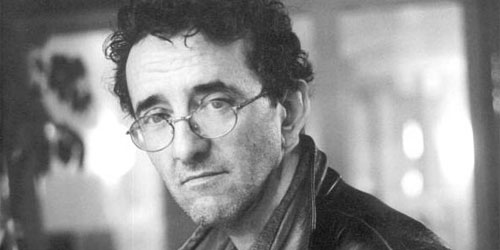April 17, 1919 Juan Rodolfo Wilcock is born in Buenos Aires to an English father, Charles Leonard Wilcock and to an Argentine mother, Aida Roemgialli, of Italian and Swiss origin.
He finishes his schools and studies at the Faculty of Civil Engineering at the University of Buenos Aires.
In March 1940 his first collection of poetry -
Libro de poemas y canciones- is awarded the Martin Fierro Prize by the Argentine Writers' Society and then in March 1941 he is also awarded the Premio Municipal.
Between 1941 and 1942 he forms a friendship with Silvina Ocampo, Adolfo Bioy Casares and Jorge Luis Borges. Years later around 1967 Wilcock will write: "These three names and these three people were the constellation and the trinity from whose gravitation I drew that light-footed tendency (that can be observed in my life and my works) to raise myself above, however modestly, my grey and human starting level. Borges represented the total genius, indolent and lazy; Bioy Casares represented active intelligence, Silvina Ocampo was between those two the Sibyl and the Magician who for them resembled in her every move and in each of her words the strangeness and mystery of the universe. I, in this spectacle an unknowing spectator remained fascinated by it and I cherish the undescribable memory one who can treasure the mystic happiness of seeing and hearing the the game of lights and shadows which were established by a certain divine trinity".
From 1942 to 1944 he edited the literary review
Verde Memoria and then from 1945 to 1947 the review
Disco.
At the beginning of 1943 he graduated in Civil Engineering and so entered as an engineer for the state railways. He took part in the rebuilding of the Transandies railways and the building of the railway between San Rafael and Malargue. He resigned in the middle of 1944.
In 1945 he published at his own cost two books of poetry:
Ensayos de poesia lirica and
Persecucion de las musas menores.
In 1946 he published
Paseo Sentimental which is awarded the 1946
Fascia d'Onore by the Argenitnian Writers' Society.
Towards the end of 1946 he published
Los hermosas dias.
In 1951 he goes on a long voyage to Europe accompanied by Silvina Ocampo and Bioy Casares, arriving for the first time in Italy.
In 1953 his sixth volume of poetry is published entitled
Sexto.
Between 1953 and 1954 he resides in London where he was as a translator for the Central Office of Information and as a literary, music and art critic for the Latin American Service of the BBC. He then returned to Buenos Aires.
He transfers to Rome in 1955 where he teaches French and English literature and works for the Argentinian edition of the
Osservatore Romano, the Vatican newspaper.
He was a literary critic for the
Prensa of Buenos Aires and worked with nearly all of the important Spanish American literary reviews. He translated more than thirty books into Spanish from English, French, Italian and German.
In June 1957 Wilcock returned to Italy and lives in Rome. He publishes various articles, essays, short stories, poems for the review
Tempo Presente and then for the Mario Panunzio's weekly
Il Mondo. In this early period in Rome he makes friends with Nicola Chiaromonte, Elsa Morante, Alberto Moravia, Ennio Flaiano. Elemire Zolla, Roberto Calasso, Ginevra Bompiani and Luciano Foa'.
Later he will write for Florence's newspaper
La Nazione, for the weekly
L'espresso and for the Roman dailies
La Voce Repubblicana, Il Messaggero, Il Tempo and for other literary reviews.
"I think that if I had to help someone understand what I am and who I am as a writer (Wilcock will write replying to an interview) I would emphasize two points which for me are fundamental: I am a poet and I belong to European culture. As a poet in prose I originate through simple paths from Flaubert who generated Joyce and Kafka who generated us (all this should be understood allegorically because these people represent epochs, whole ways of thinking). Borges wrote "Flaubert was the first to enshrine in his prose the creation of a purely aesthetic work" and Flaubert wrote the same thing "Metric combinations have been exhausted but not those of prose". As a European writer I have chosen Italian to express myself because it is the language closest to Latin (maybe Spanish is more similar but the public of the Spanish tongue is barely the spectre of a phantasm). Once the whole of Europe spoke Latin but today it speaks dialects of Latin: the
passiflora in English is called passion flower, for me they are one and the same word. Therefore the language chosen only has a relative importance, what really counts is not to lapse into folklore which can not be transferred. For me English is now too folkloric; not to mention English spoke in the United States. In those languages when one starts to fly on one's own one soon becomes levelled after just a hundred and twenty five words. It is as though a chess player was told: 'Here we only play according to our own rules, with a single knight and without rooks". Maybe Beckett doesn't realise this but he writes almost entirely in Latin; his poem
Sans from 1970 goes far further back in time, it seems Sumerian, even pictographic".
In 1975 Wilcock made a request for Italian citizenship. By a decree of the Head of State this was conceded to him post mortem on April 4 1979.
Wilcock died on March 16th 1978 in his country house in the
comune of Lubriano (in the province of Viterbo) in Upper Lazio. He is buried in the Protestant Cemetery in Rome.








